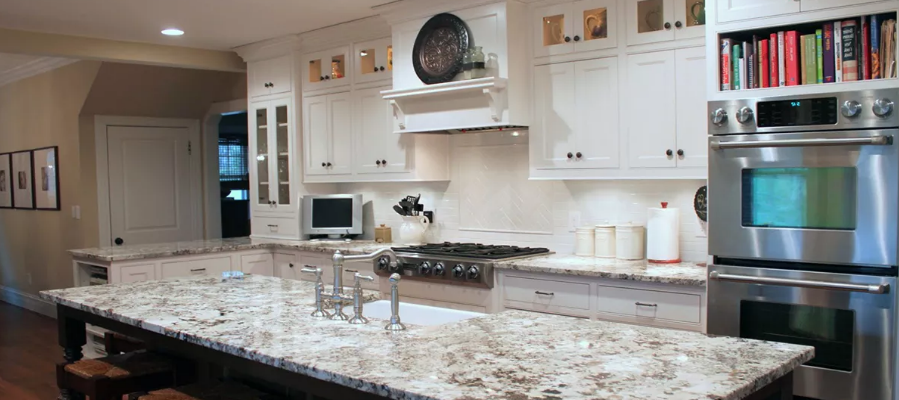If you are considering a kitchen remodel, you should consider a granite countertop for your new kitchen. Granite is popular, especially in high-end homes, for a reason, or maybe for many reasons. Granite is natural and naturally beautiful. It offers many benefits, the biggest maybe being that it does not depreciate in value like many other materials. However, you have likely never shopped for granite countertops before. Here you will find a guide to the basics of selecting a granite countertop for your kitchen remodel. Although it’s an investment, granite is one that can pay off.
What is Granite?
Granite is a natural substance formed when molten rock from the earth’s core erupted to the surface. Granite is marked by a variety of swirls and fissures, many of them creating a metallic sparkle. Slabs of granite are mined from the earth, and generally their surface is highly polished before they become countertops. This process of polishing allows the natural mineral formations within the granite to become more apparent, thus, enhancing granite’s natural beauty.
Selecting a Slab of Granite
You should always visit a showroom or retailer to see a slab of granite in person before purchasing anything. Several slabs may come from the same mine and be processed in the same way yet look very different due to granite’s natural variations. This means that you want to see the actual, specific slab you will be purchasing before you commit. Granite’s natural variations are part of its beauty, and this is a specific beauty that can only be appreciated in person. A photo won’t do.
Granite Requires Maintenance
Granite countertops do require specific maintenance. You should be aware of what your countertops will require. While some granite countertops come permanently pre-sealed, many require annual sealing. Even with adequate sealing, some substances such as red wine, tomato sauce, and oils can still stain granite, especially if it is light in color. When spills happen, clean them immediately.
Fissures Are Not Cracks
Fissures are not the same thing as cracks in a slab of granite. Fissures are naturally occurring feature of granite and represent places where the quartz within a slab of granite has separated from the slab and collected in the area that is all quartz. Although there may seem to be a visible void, a fissure does not compromise the slab’s strength or integrity. In fact, a fissure is crystalline and is filled with quartz. Fissures should be seen as part of granite’s natural beauty.
What Are Some of the Benefits of Granite?
As compared to other materials popular for kitchen countertops, granite offers many benefits. Granite, unlike many materials, has intrinsic value and does not depreciate.
Because granite is naturally formed under conditions of extreme heat and pressure, it can easily take the heat of a pot or pan. This means that you can set that hot pan down directly on your countertop and not have to worry about any damage.
Granite is totally sanitary in that it naturally resists bacterial contamination. Granite is easy to clean with just warm water and a mild detergent. Granite’s biggest benefit, however, may be that it’s naturally beautiful and naturally one-of-a-kind. Granite countertops are a stunning addition to any home and actually add value to your home.
If you are considering options for a new kitchen countertop, you should certainly consider granite. It offers a unique, natural beauty that cannot be replicated by artificial methods. While granite is not the only choice for your kitchen countertops, it is certainly a good choice, one that is preferred by many homeowners. Granite is a long-lasting material. If you commit to a slab of granite, you are committing to it long term.


